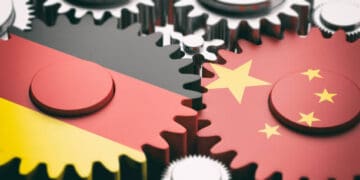The German city of Hamburg, known for its robust rail connections to the European hinterland, has become a crucial node in China’s Belt and Road Initiative (BRI), with China accounting for approximately one-third of the city’s cargo throughput. Hamburg is also home to Cosco’s European headquarters, and the state-backed company is now eyeing a minority stake in one of the city’s port terminals, which would mark the first instance of foreign ownership in the former Hanseatic city-state.
Axel Mattern, the CEO of the port’s marketing department, emphasized the importance of having Chinese involvement in port ownership to ensure the stability of supply chains. Concerns arise that without such involvement, cargo routes might be rerouted elsewhere.
The trade relationship between Hamburg and China is characterized by the exchange of goods such as cars, chemicals, precision machinery from Germany to China, and mobile phones, computers, household appliances, and clothing from China to Germany. While Hamburg’s trade balance with China is currently even, there is a growing sense that the overall China-Germany relationship may be lopsided.
The United States’ increasingly confrontational stance towards China, criticism of China’s human rights record, interference in Hong Kong, and concerns about competition with China’s manufacturing sector are influencing Germany to reconsider its trade approach.
Before Angela Merkel assumed the German chancellorship in 2005, China joined the World Trade Organization (WTO) and signed a partnership agreement with the European Union, envisioning its transition toward democracy and free-market principles. German companies have significantly benefited from China’s economic rise since the 1970s, with China becoming Germany’s largest trading partner in 2015. Despite the challenges posed by the COVID-19 pandemic, trade between the two countries reached $258 billion in 2020, representing a three percent increase.
Under President Xi Jinping, China’s economy has remained under strict state control, its foreign policy has become more assertive, and human rights concerns, particularly in Xinjiang and among political dissidents, have intensified. The U.S.-China relationship is also at odds, with President Joe Biden continuing the hardline stance on trade, human rights, and other contentious issues.
Reinhard Bütikofer, a Green Party MEP and prominent critic of China in Germany, argues that Germany’s China policy is skewed toward the interests of multinational corporations, potentially at the expense of other sectors and security concerns. Earlier this year, the Chinese foreign ministry imposed sanctions on Bütikofer and other European officials critical of Beijing, leading to a diplomatic standoff that delayed a long-awaited EU trade deal with China.
While Germany’s automotive sector remains optimistic about its relations with China, smaller specialized manufacturers are concerned about technology transfer and competition from Chinese rivals. Germany introduced laws in 2017 to safeguard sensitive industries, and several takeover attempts by Chinese state-backed companies have been blocked. The Federation of German Industries has labeled China a “systemic competitor” and called for EU legislation to address state-subsidized industries and protect European technology companies.
Public opinion in Germany has increasingly turned against China, with a majority of respondents in a recent poll favoring a tougher stance against Beijing. As Germany’s political landscape evolves, particularly with the Green Party likely to play a role in the next coalition government, the country may shift toward a more critical and European-centric approach to its trade relations with China.
Despite these shifting dynamics, outgoing Chancellor Angela Merkel and her successor Armin Laschet have both emphasized the importance of continued engagement with China, particularly in the economic sphere. Hamburg’s expected approval of Cosco’s purchase underscores the significance of pragmatic business relationships amid evolving geopolitical complexities.
As Mattern notes, maintaining a level of trust and cooperation is paramount, even as global trade dynamics evolve.
Find the latest supply chain report news at The Supply Chain Report. For international trade tools, see ADAMftd.com.
#Hamburg #China #BeltAndRoadInitiative #Cosco #PortOwnership #SupplyChainStability #GlobalTrade #GermanyChinaRelations #EUTradePolicy #GeopoliticalComplexities #ChinaGermanyTrade #XiJinping #TradeBalance #USChinaTensions #TechnologyTransfer #MultinationalCorporations #GreenParty #EUChinaRelations #EconomicEngagement #ChancellorMerkel #ArminLaschet #ChinaTradePolicy















